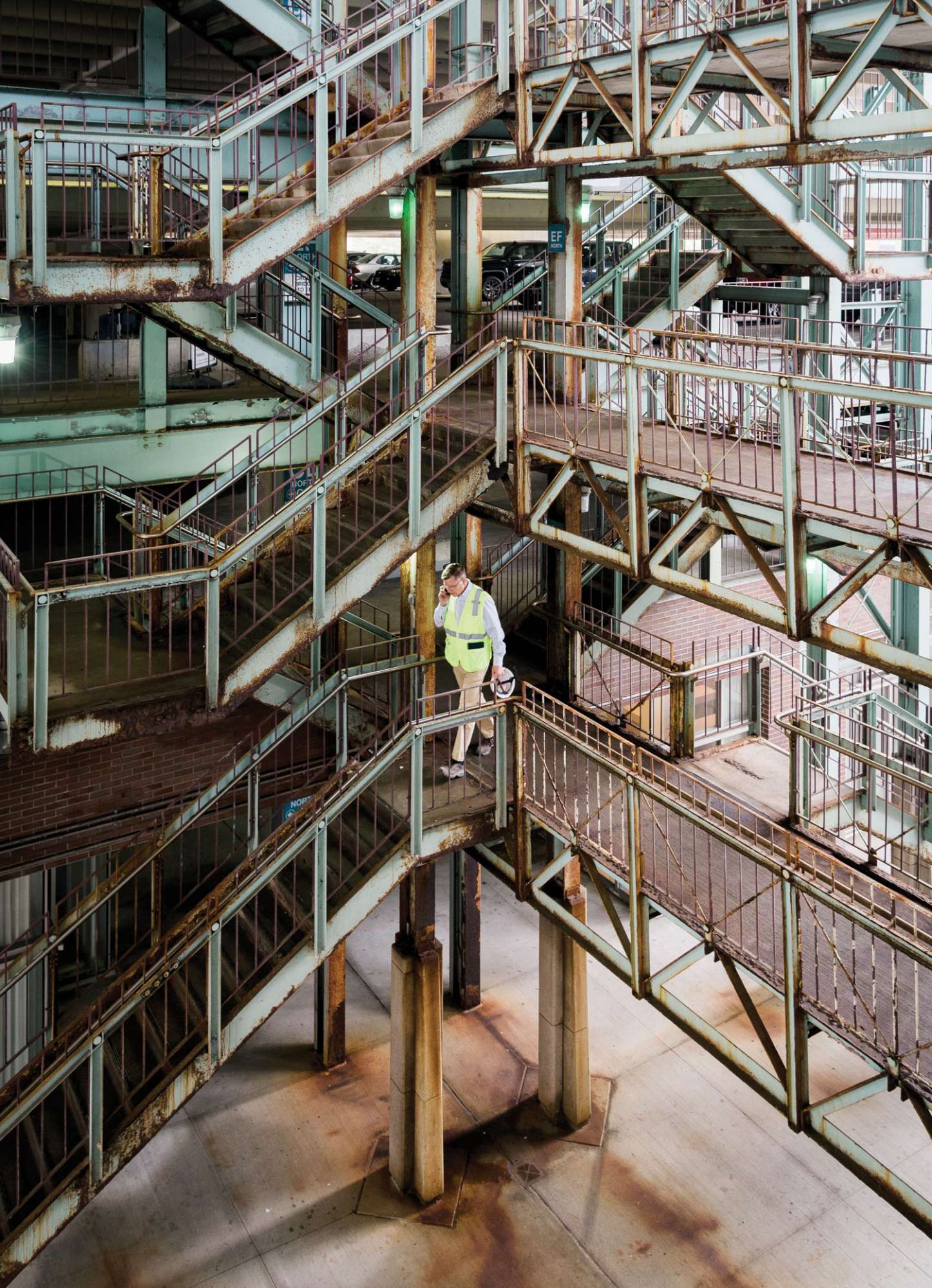LYNN — Waiting for customers on a weekday morning, taxi driver Rafael Espinal wishes the Market Street commuter garage was the transportation mecca it was designed to be three decades ago.
“We used to pick up a lot of people,” said the Garcia’s Taxi driver. “It’s slow now.”
“Slow” is the operative word for the sprawling concrete structure with its two parking wings flanking two metal framework staircases.
Fewer than half of the garage’s 978 parking spaces are filled on a weekday and that number mirrors parking volume statistics provided by the Massachusetts Bay Transportation Authority (MBTA) for 2019 and 2018.
Average parking use for the garage was 51 percent for the two-year period. Overlooking downtown Lynn with its businesses and residences, the garage saw as few as 44 percent of its spaces filled in June 2018 and as many as 59 percent used in February 2019 when the facility is a semi-sheltered parking area for Lynn drivers ordered to remove their vehicles from local streets during a snow emergency.
By comparison, MBTA garages, including the Wonderland garage at the Wonderland Blue Line rapid transit stop in Revere, are almost filled to capacity on weekdays. The Salem garage logged a 77 percent average use a year ago.
“The Lynn garage is the least utilized of the MBTA garages in terms of average weekday utilization,” said MBTA spokesman Joe Pesaturo.
Local firms and residential management companies lease about 420 spaces in the garage for their employees and tenants. The most recent uptick in garage use comes from construction workers parking in the garage and crossing Munroe Street to the apartment complex under construction.
The giant structure is a study in contradictions. Opened in 1992 at a construction cost of $50 million, the garage was applauded by state transportation officials as a cornerstone for North Shore transportation improvements. Its busiest area now is the ground-floor dropoff lane where Espinal and other taxi drivers wait for fares.
“People come off the buses and the train,” he said.
A maintenance worker armed with a spray bottle patrols the structure’s lower levels. On the upper floors, homeless people sleep on makeshift bedding in parking spaces and needles are evidence of drug use in a stairwell shrouded in safety netting.
With its inclined floors and concrete outcroppings, the garage attracts skateboarders like Jonathan Vasquez of Lynn and friends who ignore a “no skateboarding” sign affixed to a ground-floor wall.
“It’s good for grinding and jumping and there aren’t many cars,” said Vasquez.
The inclined parking levels and central staircases are open to the weather, and they take a beating: Concrete is crumbling off steps and rust eats away at the iron beam work and bleeds onto garage flooring.
“Throughout my career, I’ve received constituent calls about the garage, including leaky pipes and elevators not working,” said state Sen. Brendan Crighton.
In 2017, according to the MBTA’s project schedule, Phase 1 work was undertaken in the garage, including waterproofing and repairs. Since then, the garage’s maintenance status has been rated as “on-call — ongoing as needed.”
Mayor Thomas M. McGee, who focused on transportation during his prior legislative tenure, said the garage has received “minimal, if any, attention” since its construction.
He linked the garage’s low use to the fact that the intent of its design as a mass transit parking facility never materialized.
“That was built with the intention that the Blue Line would come in,” McGee said.
Long-term renovations are planned for the garage with a $33 million facelift and refurbishment scheduled to start in late 2021. Pesaturo said the work will stretch over three and a half to four years.
“The design consultant, Thornton Tomasetti, will complete several phases as the firm works toward a final design by the second quarter of next year,” Pesaturo said.
Described by the MBTA as Phase 2 improvements, the work is scheduled to include “structural system repairs,” waterproofing work and fire prevention and security equipment upgrades.
Crighton is pleased with the MBTA’s plan for the garage and said it goes well beyond a “Band-Aid approach” to the facility’s upkeep.
McGee said garage upgrades can’t be viewed in a vacuum but rather as a component in a broad-view plan that includes commuter rail platform improvements and the creation of an “environmental justice corridor” with ultimately electrified commuter trains making more frequent stops in Lynn and fares set at “subway prices.”
“We want to make that a state-of-the-art facility,” he said.

